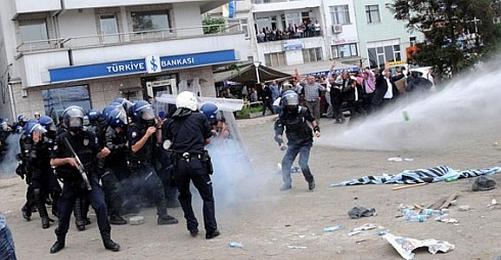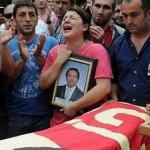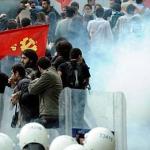Hopa Demonstrations: Stones Considered as Weapons

The indictment of the second trial against anti-government protestors in Hopa on the eastern Black Sea coast was now announced. The defendants will be tried in the scope of anti-government demonstrations in the city on 31 May. In the indictment, the stones allegedly thrown by the protestors are accounted for as "weapons". The defendants are facing up to twelve years in prison by reason of "throwing stones".
President Recep Tayyip Erdoğan held a meeting in Hopa (Artvin) in the run-up to the election on 31 March 2011. When the people of Hopa demonstrated against hydro-electronic power plants the police intervened with the massive use of tear gas and water cannons. Retired teacher Metin Lokumcu suffered a heart attack as the result of the tear gas and died.
One incident, four cases
Dozens of people were taken into custody after the incident. Ali Aksu, Erhan Köse, Görgü Demirpençe, İbrahim Aksu, İdris Akbıyık, Önder Öner and Şafak Ustabaş were tried before the Erzurum 4th High Criminal Court on charges of "making propaganda for an illegal organization" and eventually acquitted.
Charges of "opposing the Law on Meetings and Demonstrations", "resisting a police officer on duty" and "harming public property" are being pressed against Cengiz Akyüz, Şinasi Gümüşkaya, Şaban Kotil, Şafak Ustabaş and İdris Akbıyık before the Hopa Criminal Court of First Instance. The defendants are facing prison sentences of between two and twelve years.
Moreover, 28 people are being tried before the Ankara 11th High Criminal Court under allegations of "membership of an illegal organization" because they protested the death of Lokumcu.
Reason: Damaging vehicles, dancing the halay
In the latest case opened in Hopa, defendants Erhan Köse, İbrahim Aksu, Yunus Aksu and Ender Yalçın stand accused of "opposing the Law on Meetings and Demonstrations", "resisting a police officer on duty" and "harming public property".
The indictment prepared by Prosecutor Nihat Hırka claims that the defendants attended an illegal demonstration, resisted the police by throwing stones and damaged special police vehicles and other cars. They are facing between two and twelve years in jail.
"Stones are considered as weapons because it gives an advantage to the offender"
Police officer Servet Erkan, on duty at the Prime Ministerial Protection Office Presidency, was severely injured when stones were thrown to the bus of PM Erdoğan.
The indictment describes the assessment of stones as "weapons" as follows:
"In Article 265/4 of the Turkish Criminal Law, facilitating the execution of an action, encouraging the perpetrator and leaving the victim und a negative influence are reasons for an increase [of punishment] for the execution of an "armed" offence (...)".
The indictment points to the fact that the stones gave the perpetrators an advantage and were accounted for as weapons. "Hence, TCK 265/4 was to be applied".
The first hearing was set for 31 January 2012 at the Hopa Criminal Court of First Instance. (AS/VK)






